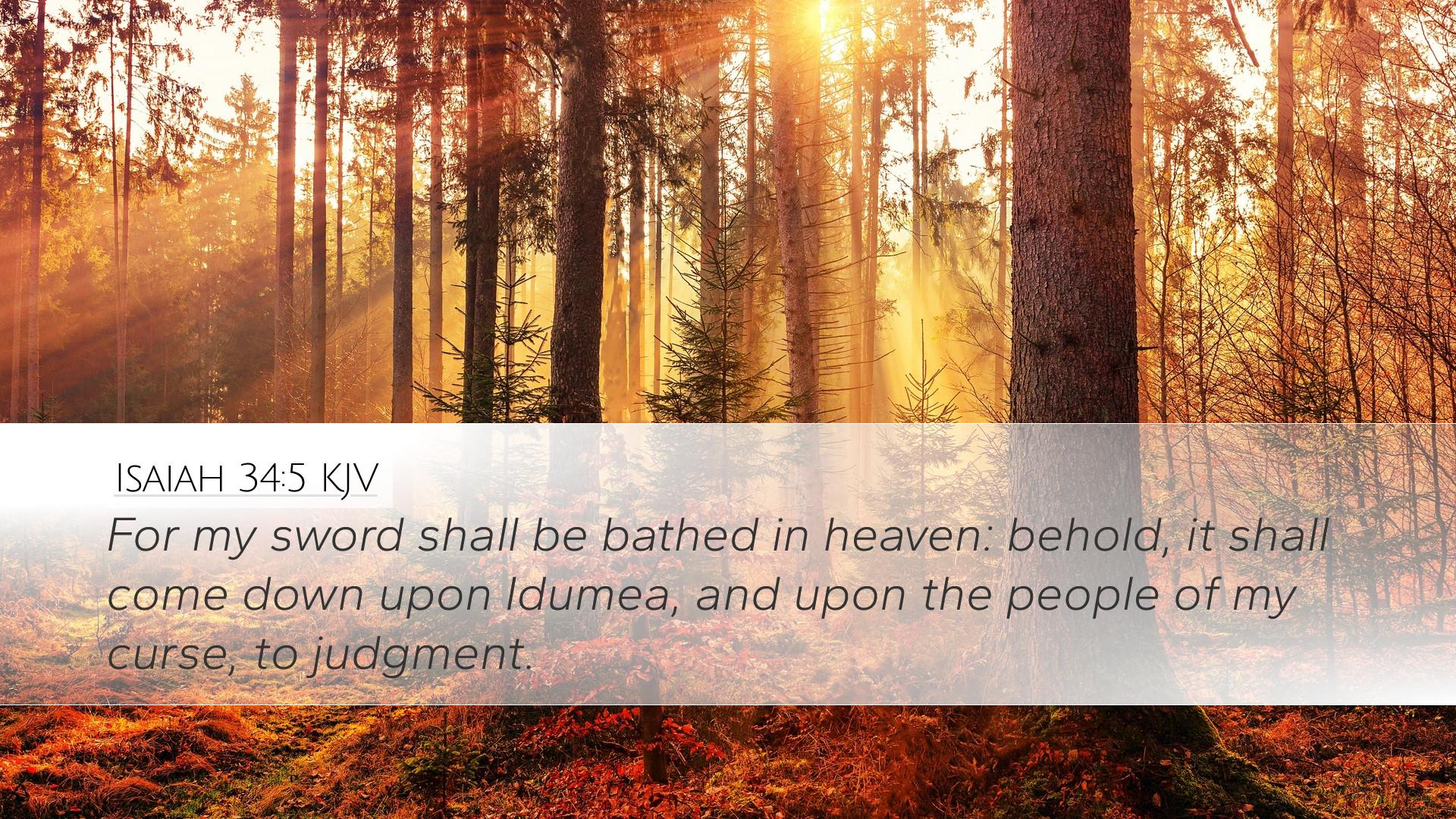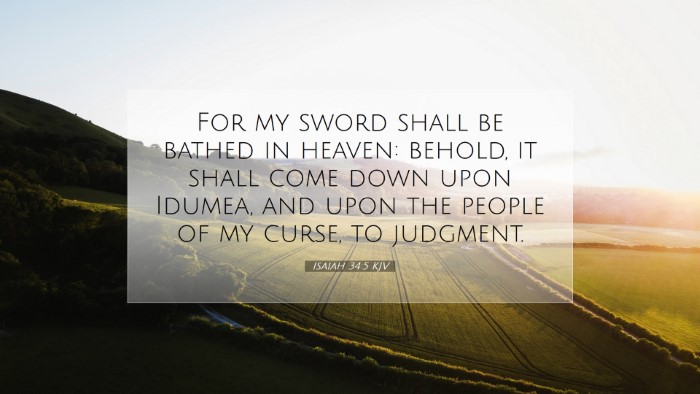Commentary on Isaiah 34:5
Verse Text: "For my sword shall be bathed in heaven: behold, it shall come down upon Idumea, and upon the people of my curse, to judgment."
Isaiah 34:5 presents a powerful image of divine judgment and prophetic declaration. The context of this verse lies within the larger prophetic oracles of Isaiah, particularly focused on God’s impending judgment on nations opposed to Him, especially Edom (Idumea). Here, we will explore insights drawn from various public domain commentaries that provide depth to our understanding of this significant passage.
Contextual Background
Isaiah’s prophecy is set within a narrative that heralds both judgment and hope. The judgment against Edom serves as a microcosm for the broader theme of God’s justice throughout the world. In this verse, we witness the metaphor of God’s sword, representing divine justice prepared to enact righteous judgment upon nations that rebel against Him.
Divine Justice and the Sword of the Lord
Matthew Henry emphasizes the gravity of God’s judgment depicted in this verse:
- Henry asserts that the "sword" is indicative of violent and just retribution that God uses against the unrepentant.
- He notes that the sword is depicted as being ‘bathed in heaven,’ signifying that God’s judgment is not arbitrary but is enacted with a heavenly authority.
Albert Barnes further elaborates on the significance of the sword’s conditioning:
- Barnes interprets the phrase “bathed in heaven” to mean that God’s judgment has been prepared and will descend decisively on the earth.
- He clarifies that Idumea (Edom) symbolizes all nations that oppose God's covenant and righteousness.
The People of My Curse
In describing the people as "the people of my curse," the text speaks to the nature of divine retribution:
- Adam Clarke interprets this phrase with an emphasis on the covenant relationship between God and His people. He writes that to be a people under a curse signifies alienation from God's blessing.
- Clarke also points out that those who are under God's curse are subjected to inevitable destruction if they do not turn back to Him.
Theological Implications
Exploring the theological ramifications of Isaiah 34:5, we can draw several vital lessons:
- Judgment is Certain: This verse emphasizes the certainty of divine judgment, indicating that God does not overlook sin but actively seeks justice.
- Call to Righteousness: The impending judgment serves as a call to nations and individuals to repent and turn back to God before it is too late.
- The Sovereignty of God: The imagery of God’s sword descending from heaven underscores His ultimate authority over all creation. God’s sovereignty encompasses judgment as well as mercy.
- Types of Sin: The curse mentioned reflects the idea that particular actions or lifestyles deserve divine retribution, echoing themes throughout Scripture where moral and ethical lines matter significantly in God’s sight.
Application for Today
Pastors, students, and theologians studying this verse are called to engage seriously with the themes of judgment and mercy as presented in Isaiah 34:5:
- Preaching God's Holiness: This verse serves as an important reminder of the holiness of God, which should compel us to preach with clarity about sin and its consequences.
- Encouraging Repentance: The reality of God’s judgment should encourage personal and collective repentance, reminding the faithful and the wayward alike that God desires reconciliation.
- Understanding God's Nature: Within this judgment context, believers are reminded of the complexity of God’s character—He is both just and merciful.
- Fostering Hope: While the judgment foretold in this passage is severe, the overall narrative of Isaiah points towards restoration and hope, emphasizing God’s desire to restore rather than to shun.
Conclusion
Isaiah 34:5 serves as a critical reminder of the weightiness of God’s judgment, reflecting His desire for righteousness among nations and individuals. Through the commentaries of Henry, Barnes, and Clarke, we gain a more profound understanding of the implications of this verse, leading to a rich study of divine justice and mercy. As such, let Isaiah’s prophetic words lead us towards a deeper commitment to living in truth and righteousness before God, awaiting the fulfillment of both judgment and ultimate restoration.


